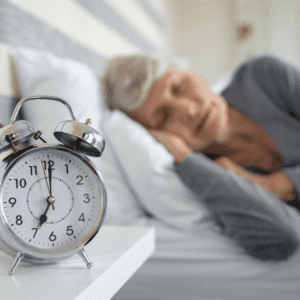
Getting enough sleep is crucial for maintaining our physical and mental health, no matter our age. However, for seniors, sleep can be particularly important for a variety of reasons. Here are just a few of the benefits of getting enough quality sleep:
- Promotes physical health: Sleep is crucial for the body to repair and rejuvenate itself. Getting enough sleep can help to promote physical health by supporting the immune system, reducing inflammation, and improving heart health.
- Improves cognitive function: Sleep is important for cognitive function, including memory, concentration, and decision-making. Getting enough sleep can help to improve these cognitive functions, which can be especially important for seniors.
- Reduces the risk of falls: Lack of sleep can increase the risk of falls, which can be particularly dangerous for seniors. Getting enough sleep can help to reduce the risk of falls by improving balance and coordination.
- Enhances emotional well-being: Sleep is important for emotional well-being, including reducing stress and improving mood. Getting enough sleep can help seniors to feel more emotionally stable and resilient.
- Improves overall quality of life: Getting enough quality sleep can improve the overall quality of life, by promoting physical and mental health, reducing the risk of falls, and enhancing emotional well-being.
 So, how can seniors ensure that they are getting enough quality sleep? Here are a few tips:
So, how can seniors ensure that they are getting enough quality sleep? Here are a few tips:
- Establishing a regular sleep schedule: Going to bed and waking up at the same time every day can help regulate the body’s sleep-wake cycle.
- Creating a relaxing bedtime routine: Activities such as taking a warm bath, reading a book, or listening to soothing music can help signal to the body that it’s time to sleep.
- Creating a comfortable sleep environment: Ensure that the bedroom is quiet, dark, and cool and that the mattress and pillows are comfortable.
- Avoiding stimulants before bed: Caffeine, nicotine, and alcohol can interfere with sleep quality, so it’s best to avoid them in the hours leading up to bedtime.
- Practicing relaxation techniques: Techniques such as deep breathing, meditation, and progressive muscle relaxation can help reduce stress and anxiety, which can interfere with sleep.
- Getting regular exercise: Regular physical activity can help improve sleep quality, as long as it is not done too close to bedtime.
- Avoiding naps: Napping during the day can interfere with nighttime sleep, so it’s best to avoid them if possible.
It’s important to note that while these techniques can be effective for many people, they may not work for everyone. If you continue to have difficulty sleeping despite trying these techniques, it may be helpful to speak with a healthcare professional for further guidance.


